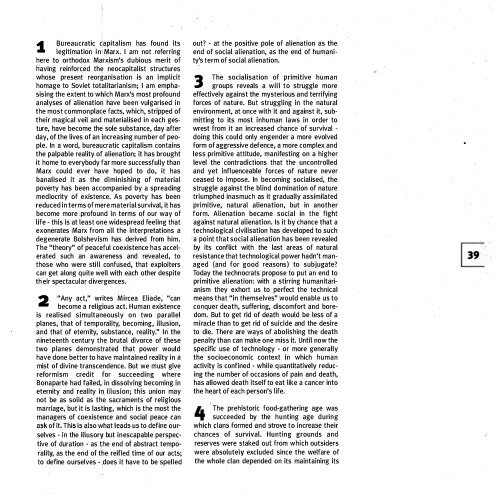SITUATIONISTS AND THE 1£CH MAY 1968
umMYFs
umMYFs
Create successful ePaper yourself
Turn your PDF publications into a flip-book with our unique Google optimized e-Paper software.
Bureaucratic capitalism has found its<br />
1 legitimation in: Marx. I am not referring<br />
here to orthodox Marxism's dubious merit of<br />
having reinforced the neocapitalist structures<br />
whose present reorganisation is an implicit<br />
homage to Soviet totalitarianism; I am emphasising<br />
the extent to which Marx's most profound<br />
analyses of alienation have been vulgarised in<br />
the most commonplaqe facts, which, stripped of<br />
their magical veil and materialised in each gesture,<br />
have become the sole substance, day after<br />
day, of the lives of an increasing number of people.<br />
In a word, bureaucratic capitalism contains<br />
the palpable reality of alienation; it has brought<br />
it home to everybody far more successfully than<br />
Marx could ever have hoped to do, it has<br />
banalised it as the diminishing of material<br />
poverty has been accompanied by a spreading<br />
mediocrity of existence. As poverty has been<br />
reduced in terms of mere material survival, it has<br />
become more .profound in terms of our way of<br />
life - this is at least one widespread feeling that<br />
exonerates Marx from all the interpretations a<br />
degenerate Bolshevism has derived from him.<br />
The "theory" of peaceful coexistence has accelerated<br />
such an awareness and revealed, to<br />
those who were still .confused, that exploiters<br />
can get along quite well with each other despite<br />
their spectacular divergences.<br />
2 "Any act," writes Mircea Eliade, "can<br />
become a religious act. Human existence<br />
is realised simultaneously on two parallel<br />
planes, that of temporality, becoming, illusion,<br />
and that of eternity, substance, reality." In the<br />
nineteenth century the brutal divorce of these<br />
two planes demonstrated that power would<br />
have done better to have maintained reality in a<br />
mist of divine transcendence. But we must give<br />
reformism credit for succeeding where<br />
Bonaparte had failed, in dissolving becoming in<br />
eternity and reality in. illusion; this union may<br />
not be as solid as the sacraments of religious<br />
marriage, but it is lasting, which is the most the<br />
managers of coexistence and social peace can<br />
ask of it. This is also what leads us to define ourselves<br />
- in the illusory but inescapable perspective<br />
of duration - as the end of abstract temporality,<br />
as the end of the reified time of our acts;<br />
to define ourselves - does it have to be spelled<br />
out? - at the positive pole of alienation as the<br />
end of social alienation, as the end of humanity's<br />
term of social alienation.<br />
3 The socialisation of primitive human<br />
groups reveals a will to struggle more<br />
effectively against the mysterious and terrifying<br />
forces of nature. But struggling in the natural<br />
environment, at once with it and against it, submitting<br />
to its most inhuman laws in order to<br />
wrest from it an increased chance of survival -<br />
doing this could only engender a more evolved<br />
form of aggressive defence, a more complex and<br />
less primitive attitude, manifesting on a higher<br />
level the contradictions that the uncontrolled<br />
and yet influenceable forces of nature never<br />
ceased to impose. In becoming socialised, the<br />
struggle against the blind domination of nature<br />
triumphed inasmuch as it gradually assimilated<br />
primitive, natural alienation, but in another<br />
form. Alienation became social in the fight<br />
against natural alienation. Is it by chance that a<br />
technological civilisation has developed to such<br />
a point that social alienation has been revealed<br />
by its conflict with the last areas of natural<br />
resistance that technological power hadn't managed<br />
(and for good reasons) to subjugate?<br />
Today the technocrats propose to put an end to<br />
primitive alienation: with a stirring humanitarianism<br />
they exhort us to perfect the technical<br />
means that "in themselves" would enable us to<br />
conquer death, suffering, discomfort and boredom.<br />
But to get rid of death would be less of a<br />
miracle than to get rid of suicide and the desire<br />
to die. There are ways of abolishing the death<br />
penalty than can make one miss it. Until now the<br />
specific use of technology - or more generally<br />
the socioeconomic context in which human<br />
activity is confined - while quantitatively reducing<br />
the number of occasions of pain and death,<br />
has allowed death itself to eat like a cancer into<br />
the heart of each person's life.<br />
I• 1 The prehistoric food-gathering age was<br />
-r succeeded by the hunting age during<br />
which clans formed and strove to increase their<br />
chances of survival. Hunting grounds and<br />
reserves were staked out from which outsiders<br />
were absolutely excluded since the welfare of<br />
the whole clan depended on its maintaining its










